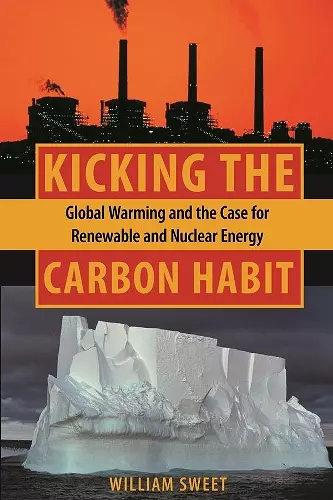Kicking the Carbon Habit
Global Warming and the Case for Renewable and Nuclear Energy
Format:Hardback
Publisher:Columbia University Press
Published:19th May '06
Currently unavailable, and unfortunately no date known when it will be back

Synthesizing information from leading scientists and the most up-to-date research, science journalist William Sweet examines what the United States can do to help prevent climate devastation. He explores advances made by climate scientists over the past twenty years and addresses the various political and economic issues associated with global warming, including the practicality of reducing emissions from automobiles, the efficacy of taxing energy consumption, and the responsibility of the United States to its citizens and the international community to reduce greenhouse gases. Timely and provocative, Kicking the Carbon Habit is essential reading for anyone interested in environmental science, economics, and the future of the planet.
Examines what the United States can do to help prevent climate devastation. This title explores advances made by climate scientists and addresses the various political and economic issues associated with global warming, including the practicality of reducing emissions from automobiles, and the efficacy of taxing energy consumption.With glaciers melting, oceans growing more acidic, species dying out, and catastrophic events like Hurricane Katrina ever more probable, strong steps must be taken now to slow global warming. Further warming threatens entire regional economies and the well being of whole populations, and in this century alone, it could create a global cataclysm. Synthesizing information from leading scientists and the most up-to-date research, science journalist William Sweet examines what the United States can do to help prevent climate devastation. Rather than focusing on cutting oil consumption, which Sweet argues is expensive and unrealistic, the United States should concentrate on drastically reducing its use of coal. Coal-fired plants, which currently produce more than half of the electricity in the United States, account for two fifths of the country's greenhouse gas emissions of carbon dioxide into the atmosphere. Sweet believes a mixture of more environmentally sound technologies-wind turbines, natural gas, and nuclear reactors-can effectively replace coal plants, especially since dramatic improvements in technology have made nuclear power cleaner, safer, and more efficient. Sweet cuts through all the confusion and controversies. He explores dramatic advances made by climate scientists over the past twenty years and addresses the various political and economic issues associated with global warming, including the practicality of reducing emissions from automobiles, the efficacy of taxing energy consumption, and the responsibility of the United States to its citizens and the international community to reduce greenhouse gases. Timely and provocative, Kicking the Carbon Habit is essential reading for anyone interested in environmental science, economics, and the future of the planet.
His lively, clear reporting of both the science and politics of climate change... Make the book a pleasure to read. -- Doug Macdougall The Chronicle Review Sweet knows what he is talking about... Kicking the Carbon Habit is a great place to kick-start the debate and cool down the rhetoric. -- William Tucker Wall Street Journal An important contribution to the debate. Globe and Mail The book is extremely well written... Highly recommended. Choice Clearly written and very well-informed. Future Survey A must-read for anyone who wants a good summary of our current understanding of global warming and the options before us. -- Andrew C. Kadak Physics Today Sweet's book is a readable, compelling and hard-nosed analysis of this vast and complicated subject. The Exeter Bulletin [An] excellent survey perfect for both school and public libraries. The Midwest Book Review
- Winner of Choice Outstanding Academic Title 2006
ISBN: 9780231137102
Dimensions: unknown
Weight: unknown
272 pages